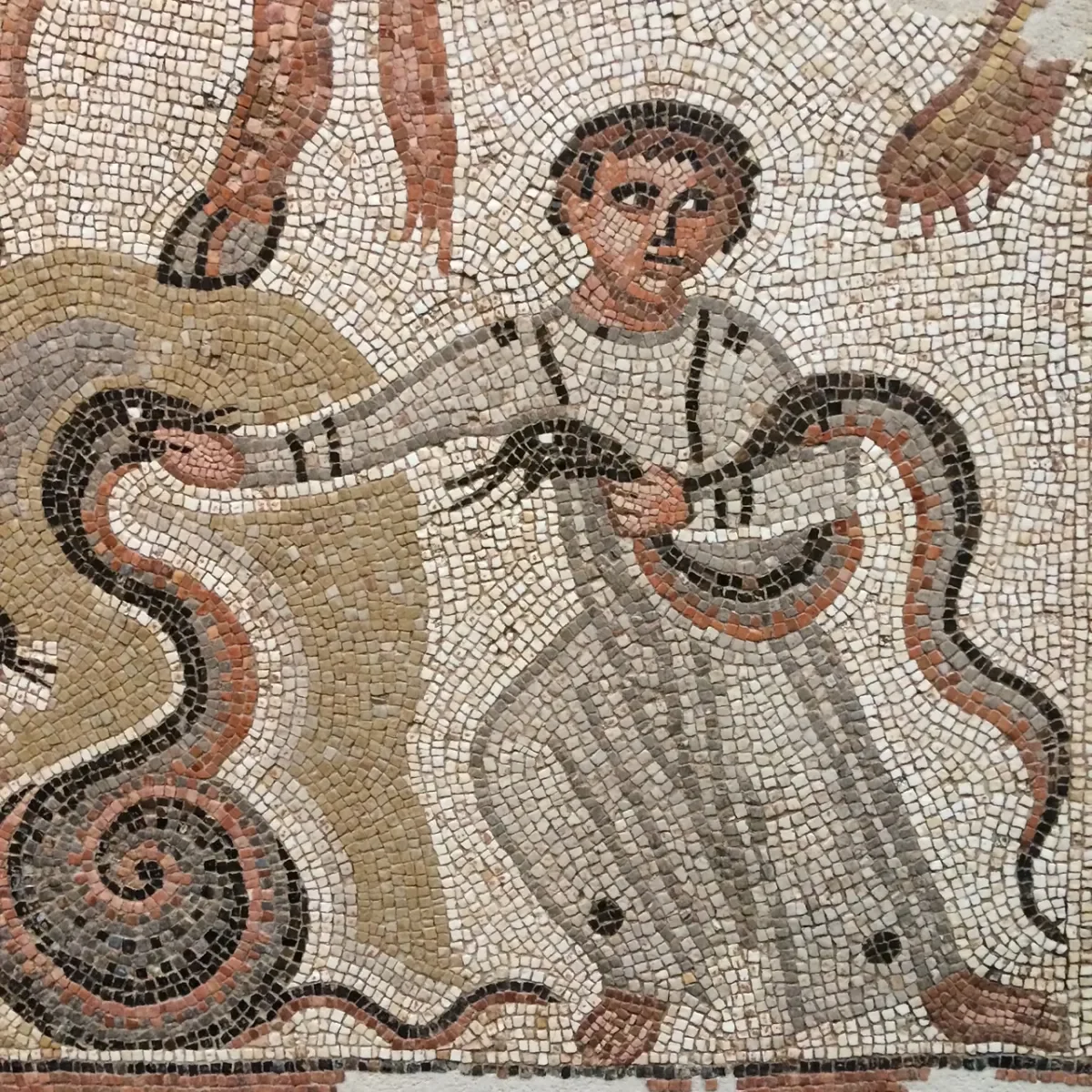
Didáskalia: how new Ophidians are forged.
The Didaskalia is the rigorous and official system of instruction within The Synodus.
It stands as the academic and disciplined structure that frames the aspirant for service and accession to the Administration. This ensures the intellectual integrity of the Gnōsis and provides the essential knowledge necessary to uphold the Taxis (Order).
Our purpose is not merely to educate, but to ensure that the foundational wisdom of the Synodus is preserved and advanced by an intellectual elite.
Curriculum Overview
-

Foundations of Doctrine
Training begins immediately with the Novice phase, focused on acquiring indispensable linguistic and theoretical prerequisites. This stage mandates courses such as "Propedeutic to Liturgical Latin" and "The Serpent: theoretical premises to Ophidism," alongside the first approach to the Introductory Treatise on Ophidism. As the aspirant advances to Neokoros, study broadens to the technical and doctrinal protocols of the sacred space with modules like "The Sacred Space: Protocol and Maintenance" and "Advanced Doctrine of the Taxis."
-

Liturgical Mastery and Ritual Axioms
The elevation to the rank of Sacrist marks the crucial shift from theoretical study to the integrity of the ceremonial procedure. The Sacrist is entrusted with the direct management and proper handling of all sacred objects and vestments on the altar. This is a role of profound responsibility, ensuring that the material world perfectly reflects the purity of the spiritual rite. Sacrists are therefore required to complete intensive modules on "Axioms of Ophidian Liturgy," studying the theoretical principles and fundamental rules that govern our central celebrations, and "Protocol of the Altar and Holy Objects."
-

Supreme Philosophy and Contextual History
The educational journey culminates in the qualification of Hiereologos, demanding both advanced ritual mastery and deep academic insight. The Hiereologos dedicates their study to "Festive and Alternative Liturgies" and the profound "Symbolism of the Canonic Ierà." Crucially, the practical service is integrated with advanced academic inquiry: “Cultural Context of Ancient Religious Systems”. This mandatory course roots the Ophidian in storiography and comparative analysis, providing a contextual understanding of the philosophical and religious systems.
The discipline of knowledge is the first prayer of the Ophidian. One does not ascend to the Taxis only through faith, but through the rigorous Gnōsis that forges the interpreter.
Our Courses
Access position: Novice
Description: Fundamentals of essential liturgical grammar and vocabulary, ensuring the correct understanding and recitation of fundamental rites in Canon Law Latin.
Propedeutic to Liturgical Latin
Access position: Hierologos
Description: Study of the birth and development of the wester philosophical thought in the Mediterranean Basin, taking into special consideration the Greek and the Roman World.
Fundamentals of Western Philosophy
Access position: Novice
Description: In-depth analysis of core theological concepts, including the nature of the Serpent, its autonomous manifestation, and the meaning of its symbology.
The Serpent: Theoretical Premises to Ophidism
Access position: Sacrist
Description: Comparative study of ancient religions in the Mediterranean Basic to establish the historical and deep philosophical background of the Synodus’s doctrinal concepts.
Ancient Religions and Gnosis: Origins of the Taxis
Becoming Exegete: From Liturgy to Doctrine
The office of Liturgist marks the achievement of full ritual authority, yet the Taxis requires that leadership must be founded upon supreme doctrinal and philosophical understanding. Progression to the office of Exegete is not an automatic ascent, but an intellectual conquest demanding rigorous self-discipline beyond the core curriculum of the Didaskalia.
The Exegete is the proper interpreter of Doctrine. To ensure the purity of the Gnōsis and the definitive resolution of all doctrinal disputes, it is essential that the candidate achieve autonomous mastery of canonical thought.
The Compendium of Hierarchical Readings
To this end, the Synodus mandates a Compendium of Hierarchical Readings. This is not a formal course, but an unforgiving path of individual study.
The prescribed texts cover the critical areas of philosophy, history, and Ophidian theology, serving as the necessary intellectual foundation for the Research Dissertation required for accession to the office. Only by demonstrating profound and autonomous mastery of these works will the Liturgist be permitted to submit their Will to the Synodus and complete their entry into the highest doctrinal authority.
-
Plato, Phaedrus (276a–278e) – the duality of pharmakon
Parmenides, Fragments (esp. B2, B3, B6, B8)
Aristotle, Metaphysics, Book XII
Jacques Derrida, Plato's Pharmacy (in Dissemination)
Giorgio Agamben, Language and Death
Reiner Schürmann, Heidegger on Being and Acting
Jean-Luc Nancy, The Inoperative Community
Heidegger, The Principle of Reason
Pierre Hadot, Philosophy as a Way of Life (Ch. 1-2)
Thomas Sheehan, Making Sense of Heidegger (Ch. 3: Being as Meaning)
-
Heraclitus, Fragments (esp. B53, B80)
Empedocles, Fragments (esp. B17, B26, B35, B115)
Aristotle, Physics Book I-III
G. Colli, La Sapienza Greca, vol. II
Catherine Malabou, The Ontology of the Accident
Jean-Luc Marion, Being Given
Quentin Meillassoux, After Finitude
Gilles Deleuze, Difference and Repetition (Introduction, Ch. I)
Cornelius Castoriadis, The Imaginary Institution of Society
-
Plato, Parmenides, Theaetetus
Plotinus, Enneads, esp. V.3, VI.9
Dionysius the Areopagite, Mystical Theology
Jean-Luc Nancy, The Sense of the World
Slavoj Žižek, The Parallax View
Georges Bataille, Inner Experience
Michel Henry, The Essence of Manifestation
Simone Weil, Gravity and Grace
Emanuele Severino, The Essence of Nihilism
-
Aristotle, Organon (esp. Categories, De Interpretatione)
Augustine, De Magistro
Aquinas, De Veritate, Q1, Q14
Umberto Eco, The Limits of Interpretation
Paul Ricoeur, The Rule of Metaphor
Michel Foucault, The Order of Discourse
Elisa Paganini, Where not to look for fictional objects
Elisa Paganini, How to Create Indeterminately Identical Fictional Objects
Anthony Kenny, Frege: An Introduction to the Founder of Modern Analytic Philosophy
Daniel Chandler, Semiotics: the basis




